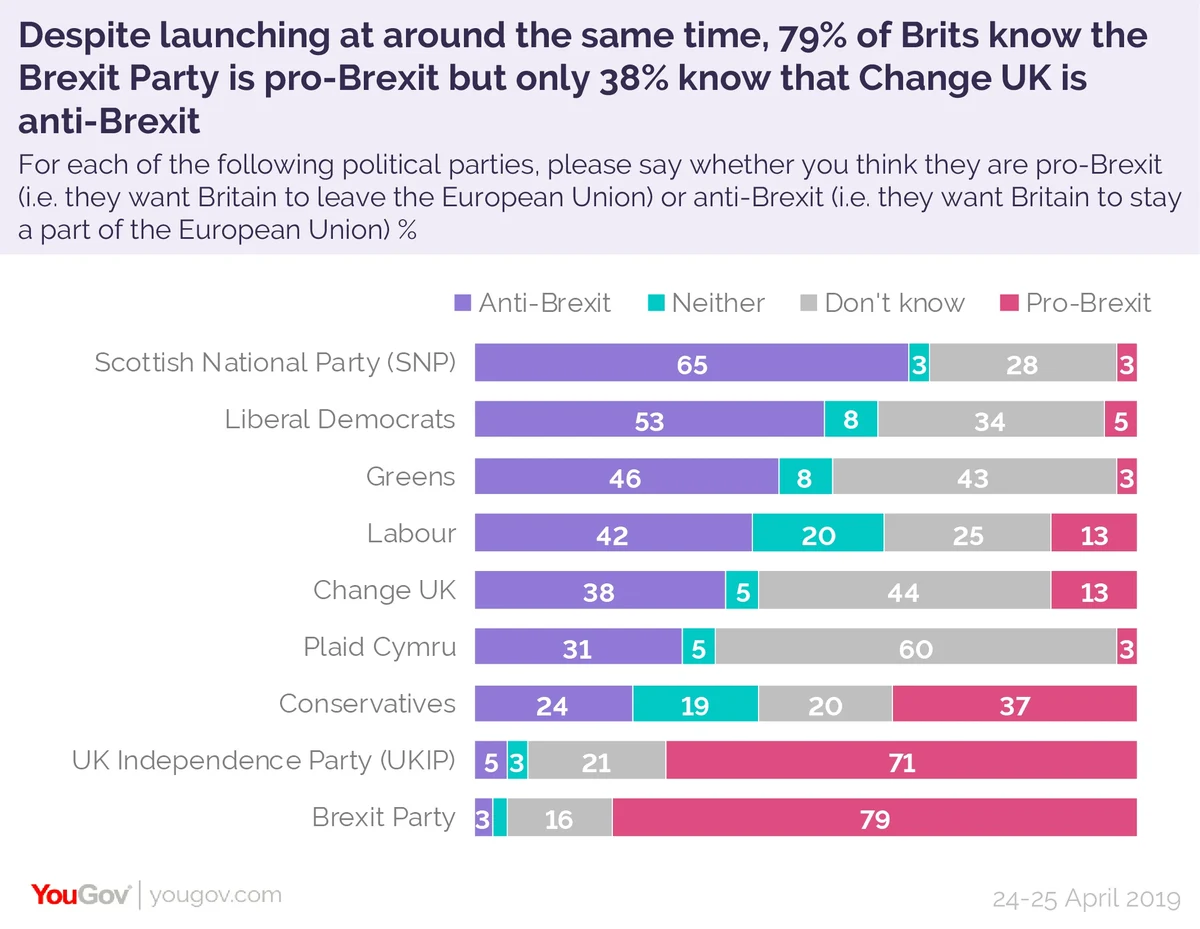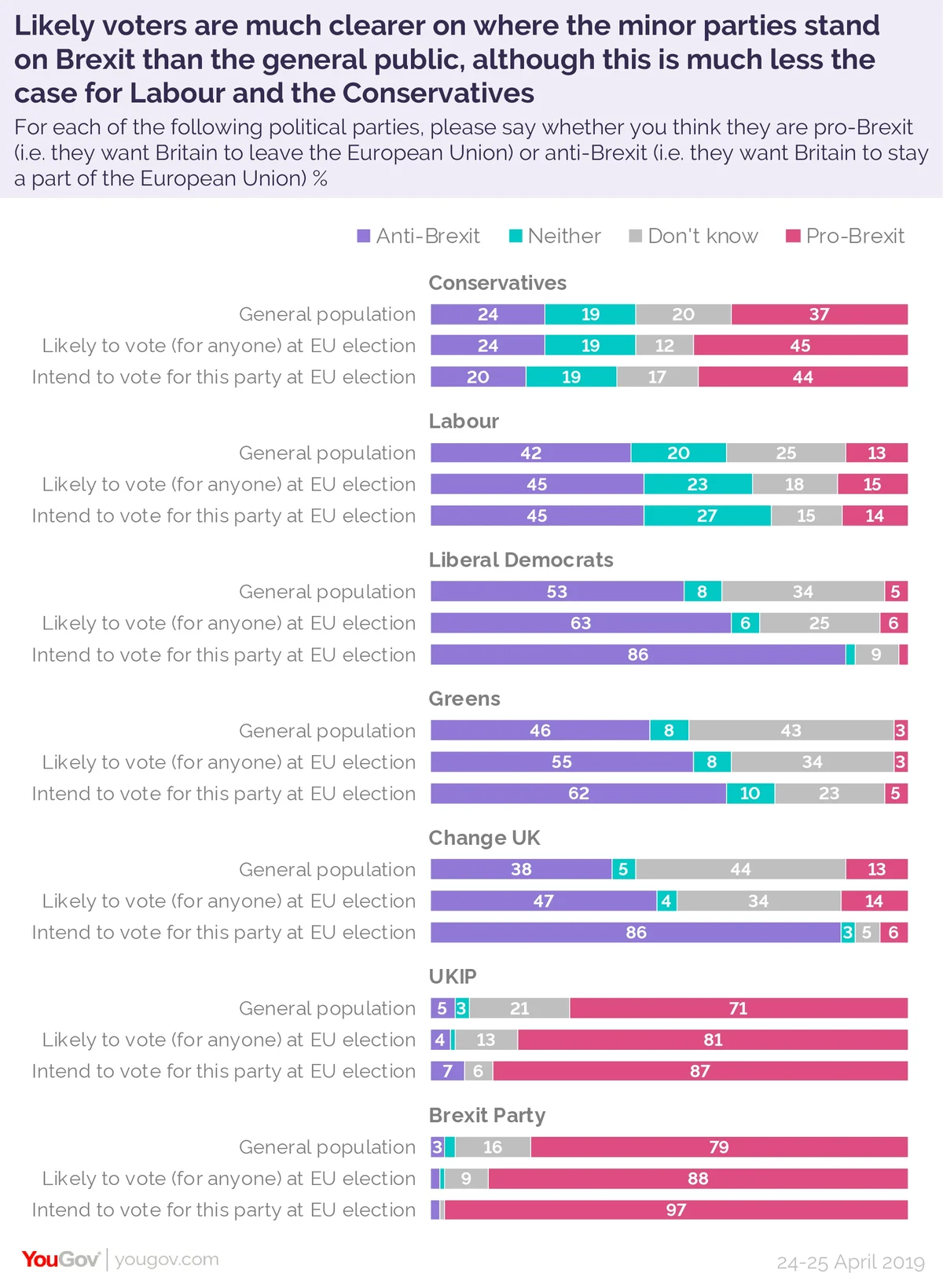Britons are less sure than you might think
It is always good to examine basic assumptions when it comes to public opinion. As we approach the EU Parliament elections on 23 May, the Lib Dems have revealed that they will campaign under the name “Liberal Democrats – to stop Brexit”. But surely everyone knows that the Lib Dems are anti-Brexit? Being pro-European has been party policy for many years, surely everyone knows that, right?
Wrong. While in the Westminster bubble you may be able to throw a party name at someone and have them spit out their Brexit stance in an instant, many Britons don’t pay that much attention to politics. Now a new YouGov survey uncovers how well known the parties’ stance on Brexit are.
The results affirm the wisdom of the Lib Dems’ decision: only 53% of the public know that the party is anti-Brexit. They are not even Britain’s most recognisably anti-Brexit party – that honour goes to the SNP, with 65% of people identifying the party’s stance as wanting to keep Britain in the EU.

Likewise, just 46% know that the Greens are anti-Brexit, while newcomers Change UK are only recognised as being anti-Brexit by 38% of Britons, despite it being about the only recognisable policy stance the party has taken to date.
Despite having launched at about the same time as Change UK, the Brexit Party has managed to make its stance clear. It is unsurprisingly the most recognisably pro-Brexit group, with 79% of Britons managing to correctly pin down the party’s stance. Slightly further behind are UKIP, which 71% of Britons are aware is pro-Brexit.
The most muddled opinions regard the two main parties. Four in ten people (42%) consider Labour to be anti-Brexit, while a similar proportion see the Conservatives as pro-Brexit (37%). Nevertheless, 24% think the Tories are anti-Brexit, and 13% think Labour are pro. On top of which 19-20% of Britons think the two main parties are neither in favour of nor against leaving the EU, a substantially higher rate than for any other party.
Recognition rates are higher among likely voters – except for the Conservatives and Labour
Of course, elections are decided by those who turn up. So how do these figures change when we look specifically at a) the overall pool of likely EU Parliament voters and b) those who have specifically said they intend to vote for each party.
We see here that the most dramatic differences are experienced by the smaller anti-Brexit parties. While only 38% of all Britons believe that Change UK is anti-Brexit, this rises to 47% of likely EU Parliament voters and 86% of those who intend to vote for Change UK.
The Liberal Democrats see a similar situation: while only 53% of the general public know they are anti-Brexit, this rises to 63% of likely EU Parliament voters and 86% of those who say they are going to vote Lib Dem later in the month.
The Greens also see a more modest increase in recognition: 55% of likely EU election voters and 62% of those who intend to vote Green recognise the party as anti-Brexit, up from only 46% of the population as a whole.
These additional results are likely to assuage supporters of anti-Brexit parties somewhat. Nevertheless, the disparity between the awareness among the most dedicated party supporters and the likely electorate and public at large represents a huge missed opportunity in terms of possible support that has been squandered by failing to make even their most basic messaging public knowledge.

While the stance of UKIP and the Brexit Party was already widely known, among likely voters and party supporters it is more clear still. For UKIP, 81% of all likely EU voters and 87% of those who intend to back the purple party know they are pro-Brexit (compared to 71% of the public), while for the Brexit Party 88% of likely EU voters and fully 97% of those who plan to vote for Farage’s new party say that the entity is pro-Brexit (compared to 79% of all Brits).
The Tories only see relatively minor changes in opinion when you shift from the public to the other two groups. While 37% of people see the Tories as pro-Brexit, this rises to 45% among likely EU election voters and 44% among those who will back the PM’s party at the elections.
Perhaps most interesting is the difference when it comes to Labour – or lack thereof. While 42% of Brits believe them anti-Brexit, this figure barely shifts to 45% of likely EU election voters and the same figure for those who intend to back the party specifically. Similarly, the 13% all Brits who think Labour is pro-Brexit is essentially matched by the other groups at 14-15%. The most notable change is that those planning to cast their ballot for Labour on 23 May are more likely to say the party is “neither” pro- nor anti-Brexit, at 27% compared to 20% of all Britons.
Photo: Getty






